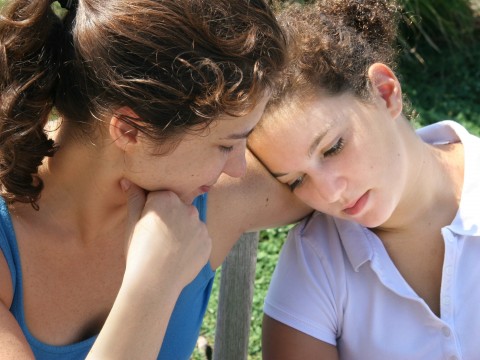
Being able to ask questions is a very important communication skill that makes conversation sound lively and interesting. If you’re going to chat with a native Russian speaker, or if you want to travel to Russia one day, you should definitely know some basic questions in this language.
In this guide, we’ll help you learn ten of the most common questions in Russian. We’ll also give you some information about how to use these Russian questions and answers depending on the age of the person you’re speaking to, and teach you some Russian question words.
Let’s begin!
 Table of Contents
Table of Contents
- Как тебя зовут?
- Откуда ты?
- Сколько тебе лет?
- Ты говоришь на ___?
- Сколько ты учишь ____?
- Ты был в ___?
- Как дела?
- Что делаешь?
- Что случилось?
- Сколько стоит?
- Conclusion
1. Как тебя зовут?

Как тебя зовут? (Kak tebya zovut?), meaning “What’s your name?” is usually the first question in Russian you’ll ask when getting to know someone.
The first word here, как (kak), meaning “how,” is an adverb; it’s also one of the most commonly used Russian question words. The next word, тебя (tebya), is the pronoun “you” in the accusative case. The last word, зовут (zovut), is the present tense form of the verb звать (zvat’), meaning “to call.” So, Как тебя зовут? is literally translated as “How are you called?”
Remember that this question is appropriate only in informal conversations with people who are your age or younger. If the situation is formal, or if you’re talking to an older person, use the following form:
- Как вас зовут? (Kak vas zovut?) – “What’s your name?”
Вас (vas) is the formal version of тебя (“you” in the accusative case).
Possible Answers
The reply to this question in Russian would be:
- Меня зовут Джон. (Menya zovut Dzhon.) – “My name is John.”
Or
- Моё имя – Джон. (Moyo imya – Dzhon.) – “My name is John.”
Simply replace “John” with your own name.

The question Как вас зовут? is the simplest way to establish contact, no matter who you’re trying to get to know.
2. Откуда ты?
Откуда ты? (Otkuda ty?) is the easiest way to say “Where are you from?” in Russian.
Like many other questions in Russian, this one begins with the adverb откуда (otkuda). The next word, ты (ty), is a pronoun in the nominative case. Like in the example above, this pronoun is applicable only to conversations with people who are your age or younger.
If you’re talking to somebody older, always say вы (vy). For example:
- Откуда вы? (Otkuda vy?) – “Where are you from?”
Possible Answer
The best way to answer is with:
- Я из Нью-Йорка. (Ya iz N’yu-Yorka.) – “I’m from New York.”
Keep in mind that you need to use your country, state, or city in the genitive case, like in the example given above.

3. Сколько тебе лет?
Сколько тебе лет? (Skol’ko tebe let?), meaning “How old are you?” is a good question in Russian to keep a conversation going.
Сколько (skol’ko) is a pronoun here. Тебе (tebe) is also a pronoun, in the dative case. Лет (let) is the plural form of the noun “year.”
If you’re speaking to an older person, you’ll need to say this instead:
- Сколько вам лет? (Skol’ko vam let?) – “How old are you?”
Possible Answer
The answer is short and simple:
- Мне 40 лет. (Mne 40 let.) – “I’m 40 years old.”

Keep in mind that asking a woman about her age is impolite, even if she looks young!
4. Ты говоришь на ___?
Of all the Russian questions and answers for beginners, this may be the most important: Ты говоришь на ___? (Ty govorish’ na ___?), meaning “Do you speak ___?” It will help you find out if the person you’re talking to speaks your language.
The first word here is ты (ty), which is the Russian pronoun “you” in the nominative case. The second word is говоришь (govorish’), which is the present tense form of the verb говорить (govorit), meaning “to speak.” After these two words, you’ll need to use the preposition на (na), which means “on” in English. Then comes the name of the language you’re asking about.
Make sure you use the prepositional case, like in this example:
- Ты говоришь на английском? (Ty govorish’ na angliyskom?) – “Do you speak English?”
The formal variant of this Russian question is:
- Вы говорите на ___? (Vy govorite na ___?) – “Do you speak ___?”
Possible Answers
You can give an affirmative answer like this:
- Да, я говорю на ___. (Da, ya govoryu na ___.) – “Yes, I speak ___.”
Or a negative answer:
- Нет, я не говорю на ___. (Net, ya ne govoryu na ___.) – “No, I don’t speak ___.”

One of the most unfair things in life is to meet a wonderful person and not to be able to communicate with him or her because of the language barrier.
5. Сколько ты учишь ____?
The Russian question Сколько ты учишь ___? (Skol’ko ty uchish’ ___?), meaning “How long have you been studying ___?” turns out to be really helpful in conversations with other students.
The first word, сколько (skol’ko), is a typical adverb used in questions. Ты (ty) is a pronoun, as mentioned previously. The last word is the present tense form of the verb учишь (uchish’), which means “to study.”
The polite form of this question is:
- Сколько вы учите ___? (Skol’ko vy uchite ___?) – “How long have you been studying ___?”
This Russian question requires the name of the field of study you’re asking about in the accusative case:
- Сколько ты учишь информатику? (Skol’ko ty uchish’ informatiku?) – “How long have you been studying programming?”
Possible Answer
- Я учу информатику два года. (Ya uchu informatiku dva goda.) – “I’ve been studying programming for two years.”
6. Ты был в ___?
There are two variants for asking “Have you been to ___?” in Russian. The first one is appropriate if you’re asking a man:
- Ты был в ___? (Ty byl v ___?)
The second one is applicable when asking a woman:
- Ты была в ___? (Ty byla v ___?)
Of course, if you’re going to ask someone older than you, you must say:
- Вы были в ___? (Vy byli v ___?)
Following the pronoun ты (ty) is был (byl) or была (byla), which is the verb “to be” in the past tense. В is a preposition which requires the prepositional case for the name of the place used after it. For example:
- Ты был в Париже? (Ty byl v Parizhe?) – “Have you been to Paris?”
Possible Answers
- Да, я был в Париже. (Da, ya byl v Parizhe.) – “Yes, I’ve been to Paris.”
Or
- Нет, я не был в Париже. (Net, ya ne byl v Parizhe.) – “No, I haven’t been to Paris.”

Travel is a perfect topic for a conversation.
7. Как дела?
Как дела? (Kak dela?), meaning “How are you?” is one of the most important questions to ask a Russian.
Как (kak) is an adverb, and дела (dela) is the plural form of the noun дело (delo), meaning “matter.”
Here are a couple of alternative ways to ask this question in Russian:
- Как ты/вы? (Kak ty/vy?) – “How are you?”
Or
- Как жизнь? (Kak zhizn?) – “How’s life?”
Possible Answers
The most typical answers are:
- Всё хорошо. (Vsyo khorosho.) – “Everything is good.”
- Отлично. (Otlichno.) – “Excellent.”
8. Что делаешь?
Что делаешь? (Chto delayesh’?), meaning “What are you doing?” is one of those basic Russian questions that you can use both in your real life and while communicating online.
Что (chto) is a pronoun that’s very often used for asking questions in Russian. Делаешь (delayesh’) is the present tense form of the verb делать (delat’), meaning “to do.”
The formal variant of this question is:
- Что делаете? (Chto delayete?) – “What are you doing?”
Possible Answers
The answer fully depends on what you’re busy with. For example:
- Я работаю. (Ya rabotayu.) – “I’m working.”
- Я на учёбе. (Ya na uchyobe.) – “I’m studying.”
9. Что случилось?
Что случилось? (Chto sluchilos’?), meaning “What happened?” is one of those good questions to ask a Russian to find out if something has gone wrong.
Что (chto) is a common pronoun in Russian questions. Cлучилось (sluchilos’) is the past tense form of the verb случиться (sluchit’sya), which means “to happen.”
Possible Answers
There’s no definite response to this question. It may be something like:
- Ничего особенного. (Nichego osobennogo.) – “Nothing special.”
- Всё плохо. (Vsyo plokho.) – “Everything is bad.”

The question Что случилось? shows that you care for what’s going on in another person’s life!
10. Сколько стоит?
Сколько стоит? (Skol’ko stoit?), meaning “How much is it?” is an absolutely essential question for you if you’re going to visit Russia.
Сколько (skol’ko), as mentioned, is a pronoun and one of the most widely used Russian question words. Стоит (stoit) is the present tense form of the verb стоить (stoit’), meaning “to cost.”
You may add the name of the thing that you want to know the price of. Also remember that you should use it in the subjective case. For example:
- Сколько стоит авиабилет? (Skol’ko stoit aviabilet?) – “How much is the air ticket?”
Possible Answer
The answer depends on the situation. For example:
- Это стоит два доллара. (Eto stoit dva dollara.) – “It costs two dollars.”
11. Conclusion
We sincerely hope that you’ve learned the basics of asking questions in Russian. Of course, this topic is enormous, and one article isn’t enough to cover it fully. Moreover, there are so many situations in day-to-day life which require their own sets of questions. That’s why memorizing questions in Russian isn’t as effective as understanding how to make them. This is especially true if you’ve been learning the language for a while.
We really recommend that you learn how to ask questions in Russian by reading articles on our website, RussianPod101.com, or with the help of our premium service MyTeacher. The second option is perfect for those who want to start using questions and answers in Russian as soon as possible. Your native Russian-speaking teacher will guide you through all the ins and outs of this topic during private lessons, so it will be really effective. You can try out our service right now, and be 100% satisfied with its quality!
What other questions in Russian would you like to learn? Feel free to leave your answers in the comment section below!










